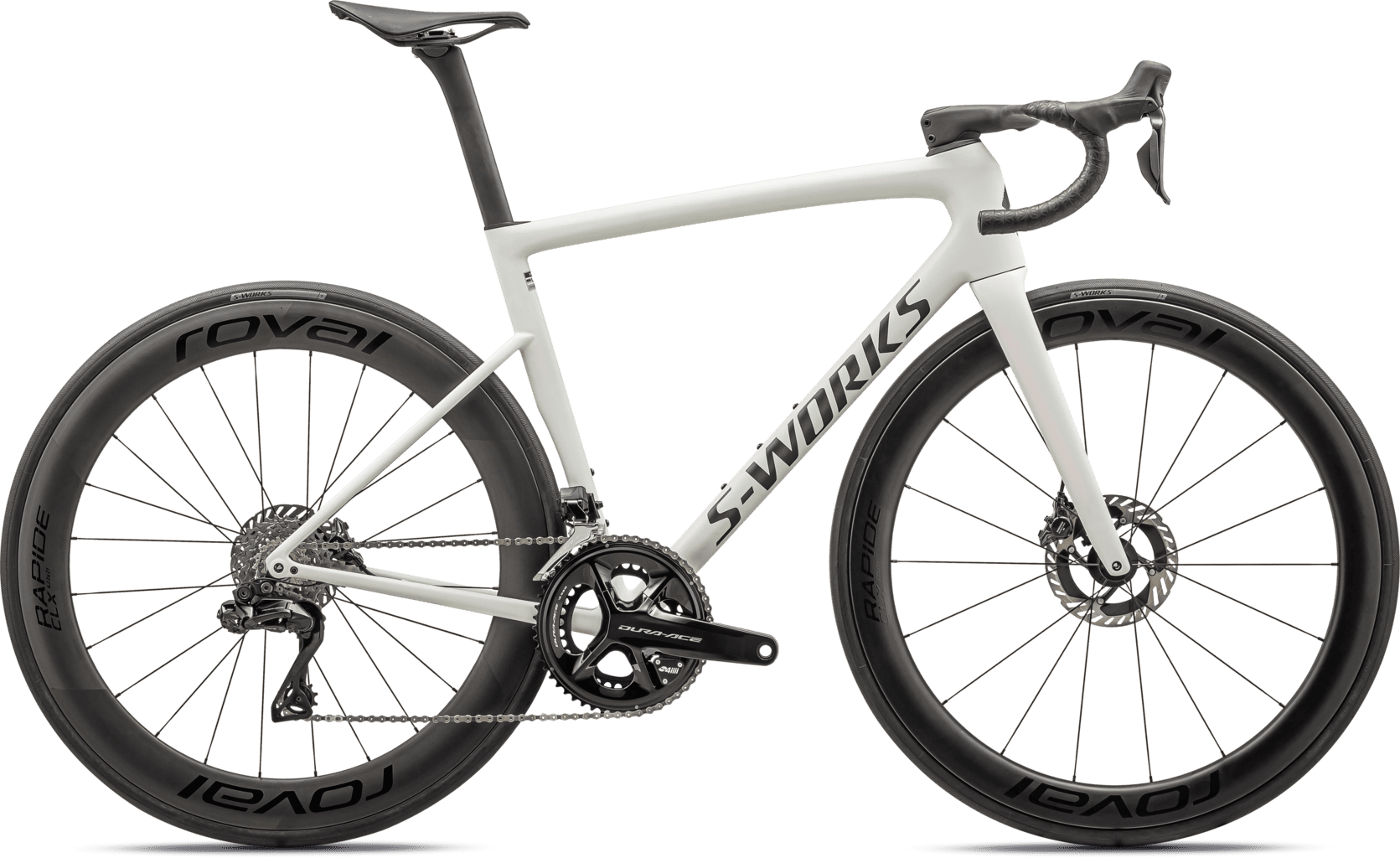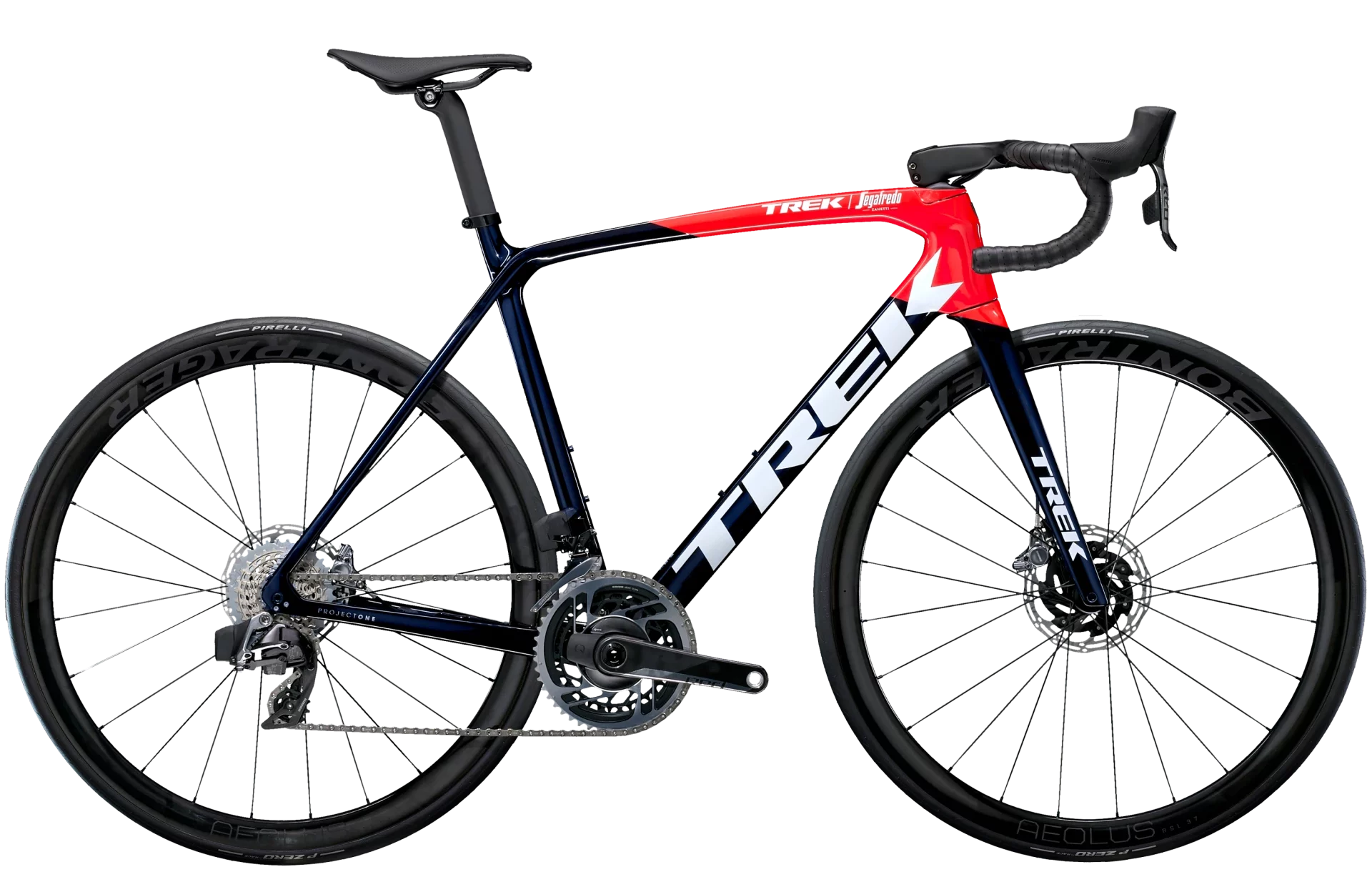In this article, I’ll guide you through a comparison between the Specialized Tarmac SL8 and Trek Emonda; both popular road bikes among cyclists.
I’ll walk through the Specialized Tarmac SL8 and Trek Emonda models lineup, their specifications, and retail pricing (USD). I’ll explain the carbon fiber technology used (Specialized FACT vs Trek OCLV), and unique frameset features for each bike.
The goal is to help you get a better understanding before you make your final purchasing decision.
| Specialized Tarmac SL8 | Trek Emonda | |
|---|---|---|
| Type of bike | All-rounder | All-rounder |
| Frame material | FACT 12r carbon FACT 10r carbon | OCLV 800 carbon OCLV 500 carbon |
| Frame sizes | 44, 49, 52, 54, 56, 58, 61 | 47, 50, 52, 54, 56, 58, 60, 62 |
| Groupset | Shimano, SRAM (12-speed) | Shimano, SRAM (12-speed) |
| Brakes | Hydraulic disc | Hydraulic disc |
| Cabling | Internal | Internal |
| Price (USD) | TBD | $4,999 to $13,199 |
Specialized Tarmac SL8

The Specialized Tarmac SL8 is the latest, all-rounder race bike.
Now in its eighth iteration, hence SL8, the Specialized Tarmac improves on the features of the Tarmac SL7 that made it one of the best bikes in professional cycling and a leading bike brand among amateur cyclists.
According to Specialized, the Tarmac SL8 has a 33% improvement in stiffness-to-weight ratio compared to the Tarmac SL7. The most significant improvement is in aerodynamics; a larger head tube with a sharper nose cone. Specialized calls this the Speed Sniffer.
The S-Works version retains the same FACT 12r carbon, while the Specialized Pro and Expert versions use the FACT 10r carbon. The difference between the S-Works and Specialized versions lies in the carbon fiber grade, choice of groupset, wheels, and components. The S-Works versions come with the newly launched Roval Rapide Cockpit, a one-pice carbon handlebar.
A size 56 bike weighs 6.62 kg (14.6 lbs) with a Shimano Dura-Ace Di2 groupset, and 6.85 kg (15.1 lbs) with a SRAM Red AXS.
There are six models in the Specialized Tarmac SL8 lineup based on its groupset setup. All models are electronic shifting only. It’s also available in frameset only for S-Works and for Specialized versions.
| Model | Frame material | Groupset | Wheelset | Max. tire size | Retail price (USD) |
|---|---|---|---|---|---|
| S-Works Tarmac SL8 | FACT 12r carbon | Shimano Dura-Ace Di2 (R9200) | Roval Rapid CLX II (51mm front, 60mm rear) | 32mm | $14,000 |
| S-Works Tarmac SL8 | FACT 12r carbon | SRAM Red eTap AXS | Roval Rapid CLX II (51mm front, 51mm rear) | 32mm | $14,000 |
| Specialized Tarmac SL8 Pro | FACT 10r carbon | Shimano Ultegra Di2 (R8100) | Roval Rapid CL II (51mm front, 60mm rear) | 32mm | $8,500 |
| Specialized Tarmac SL8 Pro | FACT 10r carbon | SRAM Force eTap AXS | Roval Rapid CL II (51mm front, 60mm rear) | 32mm | $8,500 |
| Specialized Tarmac SL8 Expert | FACT 10r carbon | SRAM Rival eTap AXS | Roval C38 (38mm) | 32mm | $6,500 |
More reading : Specialized Tarmac SL8 vs SL7 - What's Changed?
Trek Emonda

The Trek Emonda is a lightweight bike for the high mountains.
The lightest Trek Emonda frame weighs less than 700g using Trek’s OCLV 800 carbon. This is the bike Richie Porte rode to his third place in the 2020 Tour de France.
The SLR is the lightest and most expensive atop the Trek Emonda models. There are six Emonda SLR options, specced electronic shifting groupsets from SRAM or Shimano.
Next in line is the SL, the mid-range, more budget-friendly option. It has the same frame design and geometry as the SLR but uses the OCLV 500 carbon instead. The groupset choices are Shimano Ultegra Di2, Shimano 105 Di2, SRAM Force AXS, or SRAM Rival AXS.
The Trek Emonda SLR and SL framesets are also available separately.
| Model | Frame material | Groupset | Wheelset | Retail price (USD) |
|---|---|---|---|---|
| Trek Emonda SLR 9 AXS | OCLV 800 carbon | SRAM Red eTap AXS | Bontrager Aeolus RSL 37 | $13,199 |
| Trek Emonda SLR 9 | OCLV 800 carbon | Shimano Dura-Ace Di2 (R9200) | Bontrager Aeolus RSL 37 | $12,749 |
| Trek Emonda SLR 7 AXS | OCLV 800 carbon | SRAM Force eTap AXS | Bontrager Aeolus Pro 37 | $9,699 |
| Trek Emonda SLR 7 | OCLV 800 carbon | Shimano Ultegra Di2 (R8100) | Bontrager Aeolus Pro 37 | $8,999 |
| Trek Emonda SLR 6 AXS | OCLV 800 carbon | SRAM Rival eTap AXS | Bontrager Aeolus Pro 37 | $8,399 |
| Trek Emonda SLR 6 | OCLV 800 carbon | Shimano 105 Di2 (R7100) | Bontrager Aeolus Pro 37 | $7,699 |
| Trek Emonda SL 7 AXS | OCLV 500 carbon | SRAM Force eTap AXS | Bontrager Aeolus Pro 37 | $6,699 |
| Trek Emonda SL 6 | OCLV 500 carbon | Shimano 105 Di2 (R7100) | Bontrager Aeolus Elite 35 | $4,999 |
Trek Emonda vs others
Specialized vs Trek carbon fiber
Specialized FACT Carbon
Specialized FACT (Functional Advanced Composite Technology) is an advanced carbon fiber technology used in high-performance Specialized bicycles. It offers a lightweight yet strong frame construction with precise carbon layup, resulting in optimal strength-to-weight ratio and improved ride quality.
FACT carbon frames are engineered to efficiently transfer power, absorb road vibrations, and provide a comfortable riding experience. With continuous innovation and refinement, FACT Carbon demonstrates Specialized’s commitment to delivering top-notch performance and enhancing the overall cycling experience.
The carbon is available in three grades. The choice between FACT 12r, 11r, or 10r carbon depends on the bike model, your preferences, riding style, and budget.
- Specialized FACT 12r Carbon is the highest-grade carbon used by Specialized. Bikes (S-Works models) with frames made from FACT 12r carbon are the lightest and stiffest in the Specialized line-up. These frames are manufactured using the most advanced techniques and materials.
- Specialized FACT 11r Carbon used to be the highest-grade carbon until the S-Works Tarmac (SL5). Today, it’s the highest-grade carbon for the S-Works Roubaix.
- Specialized FACT 10r Carbon is two steps below 12r in the Specialized carbon hierarchy. While it doesn’t provide quite the same level of weight savings and stiffness as 12r, 10r frames are still very light and stiff, providing a high level of performance. FACT 10r carbon is used in all non S-Works models and is ideal for riders who want a balance of performance and value.
Trek OCLV carbon
The OCLV (Optimum Compaction, Low Void) carbon is a proprietary carbon fiber manufacturing technology developed by Trek.
- Optimum Compaction refers to the heat and pressure applied during the curing process to squeeze out excess resin and ensure that the carbon layers are compacted to the optimal density.
- Low Void refers to the goal of reducing microscopic air pockets or voids that can occur in the carbon fiber and create weaknesses.
One of the key advantages of OCLV carbon is its ability to achieve an optimal balance between stiffness, strength, and weight. Trek engineers carefully tune the carbon layup and utilize varying modulus carbon fibers to create stiff frames in certain areas to maximize power transfer while maintaining compliance in other areas to enhance comfort and ride quality.
The OCLV carbon is available in 800 and 500 series.
- OCLV 800 is the highest-grade carbon fiber used by Trek. The carbon modulus is higher in OCLV 800, making it stiffer and lighter. The manufacturing process is more refined, using more advanced carbon and resins, leading to a bike frame that provides top performance levels for stiffness, weight, and strength. OCLV 800 is used in all models with SLR.
- OCLV 500 is a lower-grade carbon but still offers a high level of performance. It has a slightly lower carbon modulus, meaning it’s a bit less stiff and heavier than OCLV 800. OCLV 800 is used in all models with SL.
It’s worth noting that the different OCLV grades don’t only refer to the material itself, but also to the manufacturing techniques used to form the carbon fiber into bike frames. Higher-grade carbon requires more precise manufacturing techniques to take full advantage of its superior material properties.
Frameset technologies and innovations
Specialized Tarmac SL8 and Trek Emonda framesets incorporate advanced technologies to enhance their bikes’ performance and ride characteristics.
Here’s an overview of the technologies used in each bike model.
Specialized Tarmac SL8
| Name | Description |
|---|---|
| FACT carbon | Functional Advanced Composite Technology (FACT). A carbon fiber construction method that balances lightweight, stiffness, and compliance in Specialized bike frames. Available in two carbon grades; FACT 12r and 10r. A higher number indicates a higher grade of carbon. S-Works models use the FACT 12r carbon and Specialized Pro and Expert models use the FACT 10r carbon. |
| Rider-First Engineered™ | Rider-First Engineered™ is a design philosophy used by Specialized that ensures every frame size delivers the same predictable and responsive ride characteristics. This concept was first introduced with the 2015 Tarmac, and the idea has been incorporated into all models since. Instead of simply scaling frame sizes, Specialized takes into account that riders of different sizes have different weights, which are distributed differently. This means that each frame size experiences different forces. Therefore, each frame size is engineered independently with different carbon layups and tube dimensions, ensuring the optimal balance of rigidity, weight, and responsiveness for each size. In short, no matter what the frame size is, the ride quality and performance remain consistently excellent. |
| Win Tunnel | Specialized utilizes advanced tools and technologies to pursue aerodynamic excellence, such as the Win Tunnel, FreeFoil Shape Library, Computational Fluid Dynamics (CFD), and Data Acquisition (DAQ) system. The goal is to optimize aerodynamic performance by conducting wind tunnel tests, developing new airfoil shapes, simulating fluid flow, and collecting real-world data to improve rider position and enhance overall performance. |
Trek Emonda
| Name | Description |
|---|---|
| OCLV Carbon | Optimum Compaction, Low Void (OCLV). A carbon fiber technology used in Trek frames. Employs advanced layup techniques and precise carbon compaction to create lightweight, strong frames with a balanced blend of stiffness and compliance. Available in two grades; OCLV 800 and 500. A higher number indicates a higher grade carbon. |
| H1.5 geometry | Trek’s geometry design that strikes a balance between aggressive racing positioning (H1) and rider comfort (H2). H1.5 geometry provides a slightly more relaxed riding position than the racier H1 geometry, making it suitable for a wider range of riders. |
| Project One | Trek’s customization program allows riders to create personalized and unique bikes. With Project One, riders can customize various aspects of their bikes, including frame color, paint scheme, components, drivetrain, wheels, and other details. |
Where to buy
Specialized shops
- Specialized online shops. Argentina, Australia, Austria, Belgium, Brazil, Canada, Chile, China, Colombia, Czech Republic, Denmark, Finland, France, Germany, Italy, Japan, Luxembourg, Mexico, Netherlands, New Zealand, Poland, Portugal, Singapore, Slovakia, South Korea, Spain, Sweden, Switzerland, Taiwan, United Kingdom, United States
- Specialized retailers. Use this tool to find your nearest Specialized retailers.
Trek shops
- Trek online shops. Australia, Austria, Canada, Germany, Netherlands, United Kingdom, United States
- Trek retailers. Use this tool to find your nearest Trek retailers.

Alex Lee is the founder and editor-at-large of Mr. Mamil. Coming from a professional engineering background, he breaks down technical cycling nuances into an easy-to-understand and digestible format here.
He has been riding road bikes actively for the past 12 years and started racing competitively in the senior category during the summer recently.